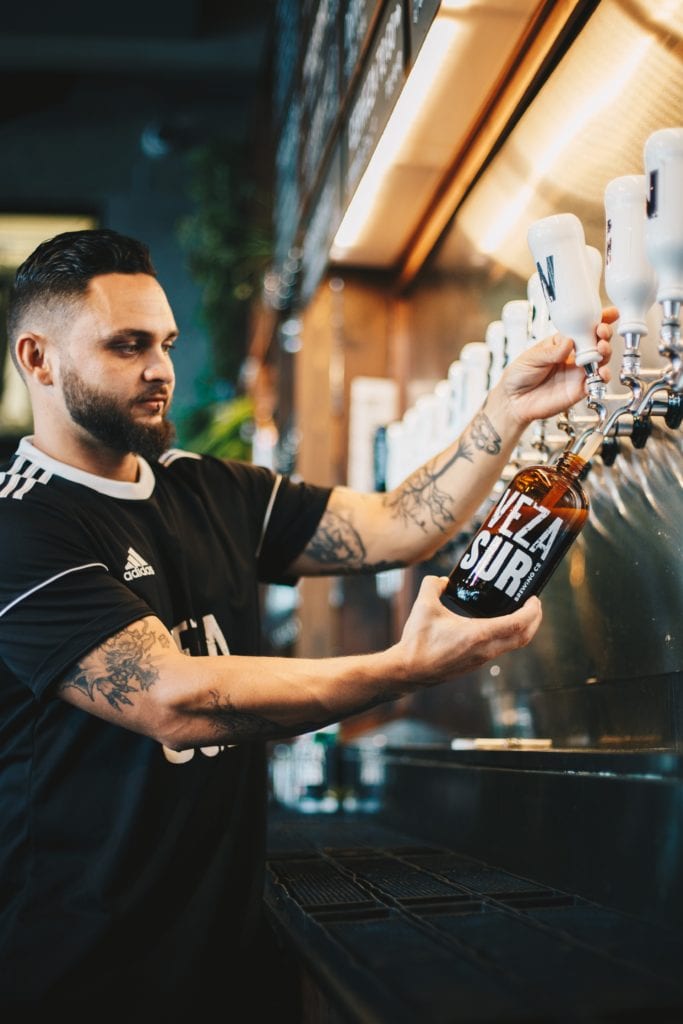Introduction
Welcome to our comprehensive guide on how to become a skilled and successful bartender. Whether you’re a passionate amateur looking to pursue a professional career or an aspiring mixologist seeking to enhance your craft, this article will provide you with invaluable insights and techniques to help you stand out in the competitive world of bartending.
The Fundamentals of Bartending
1. Acquiring Essential Skills
To become a proficient bartender, it’s crucial to master the foundational skills that form the backbone of the craft. Here are some key skills you need to focus on:
- Mixology: Understanding the art of mixing drinks is at the heart of bartending. Learn the classic cocktail recipes, experiment with unique combinations, and strive to create signature drinks that tantalize the taste buds of your customers.
- Flair Bartending: Adding an element of showmanship to your bartending skills can truly elevate your craft. Consider learning flair bartending techniques, such as juggling bottles or performing tricks, to create an engaging and memorable experience for your patrons.
- Customer Service: Exceptional customer service is essential in the hospitality industry. Develop excellent interpersonal skills, listen attentively to your customers’ preferences, and provide personalized recommendations to enhance their overall experience at your establishment.
2. Building Product Knowledge
As a bartender, having a deep understanding of various spirits, liquors, wines, and beers is imperative. Expand your knowledge by:
- Studying Alcohol Types: Familiarize yourself with different alcohol categories, including vodka, gin, rum, whiskey, tequila, and more. Understand their production processes, flavor profiles, and recommended serving techniques.
- Exploring Wine and Beer: Wine and beer are integral parts of bartending. Educate yourself on different wine varietals, regions, and food pairings. Similarly, dive into the world of craft beers, understanding various styles and their unique characteristics.
- Learning about Mixers and Garnishes: Enhancing your knowledge of mixers, such as sodas, tonics, and juices, as well as garnishes like fruits, herbs, and spices, will enable you to create well-balanced and visually appealing drinks.
Mastering Bartending Techniques
1. Perfecting Drink Preparation
The art of crafting exceptional cocktails lies in mastering bartending techniques. Here are some essential techniques to focus on:
- Muddling: Muddling involves gently crushing ingredients like fruits or herbs to release their flavors. Practice muddling techniques to extract maximum flavor while maintaining visual appeal.
- Shaking and Stirring: Understand the differences between shaking and stirring cocktails. Shake drinks with juices, syrups, or carbonated mixers to combine and chill them effectively. Stir drinks composed primarily of spirits to create a smoother texture without excessive dilution.
- Layering: Layered cocktails add visual appeal to your creations. Master the art of pouring different densities of liquids using the back of a spoon to achieve stunning layered effects.
2. Enhancing Presentation
Aesthetics play a vital role in the overall bar experience. Consider the following tips for enhancing drink presentation:
- Glassware Selection: Choose appropriate glassware for each cocktail, ensuring it complements the drink’s style and showcases its colors and garnishes effectively.
- Garnish Placement: Thoughtfully place garnishes to add visual interest and complement the flavors of the cocktail. Explore different techniques, such as citrus twists, herb sprigs, or elaborate skewers, to create eye-catching presentations.
- Glass Rimming: Experiment with rimming techniques using salt, sugar, or spices to elevate the sensory experience and add a unique touch to certain cocktails.
Creating an Engaging Atmosphere
As a bartender, your role extends beyond mixing drinks. You have the power to create a memorable atmosphere that keeps customers coming back for more. Consider the following strategies:
- Bar Setup: Design a bar layout that encourages interaction and socializing. Arrange seating areas to promote conversation and ensure easy access to the bar. Display your liquor selection prominently, showcasing the variety available.
- Lighting and Ambiance: Lighting sets the mood in any establishment. Experiment with warm and inviting lighting options that create a cozy ambiance. Consider incorporating dimmers or colored lights to enhance the atmosphere during different times of the day or special events.
- Music Selection: Curate a playlist that matches the vibe of your establishment. Choose music that appeals to your target audience and adjust the tempo based on the atmosphere you want to create. Live music or DJs can also add an extra element of entertainment.
- Signature Cocktails: Develop a menu of unique and innovative cocktails that reflect your style and the preferences of your customers. Craft creative names and descriptions that capture the essence of each drink, enticing patrons to try something new.
Building Your Bartending Career
1. Networking and Collaboration
To excel in the bartending industry, building a strong network is crucial. Here are some tips for expanding your professional connections:
- Industry Events: Attend industry conferences, workshops, and competitions to meet fellow bartenders, industry experts, and potential mentors. Participate in cocktail competitions to showcase your skills and gain recognition.
- Online Platforms: Utilize social media platforms to connect with other bartenders, share your creations, and stay updated with industry trends. Join online communities and forums to engage in discussions and learn from experienced professionals.
- Collaborations: Seek opportunities to collaborate with local businesses, such as restaurants, breweries, or distilleries. Collaborative events or guest bartending shifts can help expand your reach and introduce you to new audiences.
2. Continuous Learning
Bartending is an ever-evolving field, and staying updated with the latest trends and techniques is essential. Here’s how you can continue your professional development:
- Educational Courses: Enroll in mixology courses, advanced bartending programs, or even sommelier certifications to deepen your knowledge and enhance your skill set.
- Reading and Research: Stay informed about the latest industry publications, books, and online resources. Explore cocktail recipe books, blogs, and reputable websites dedicated to mixology and bartending.
- Bar Visits: Visit renowned bars and establishments in different cities or countries to gain inspiration from their unique approaches to mixology and ambiance. Observe their techniques, learn from their bartenders, and bring fresh ideas back to your own establishment.
1. Get a License or Permit
A license isn’t required in all states, but if you’re competing for a position against other candidates, having a license can give you the edge you need to get hired. In addition to meeting state or local requirements, a bartender license course will ensure that you’re familiar with the following topics:
- Knowledge of laws and penalties regarding minors
- Identifying the stages of intoxication in customers
- How to handle and prevent disturbances
Online bartending certification is easy to find with a quick internet search, but make sure the course is state-approved. To pass the course, you’ll need to complete training and successfully pass a test to show that you have an understanding of the material. It’s also important to note that a bartending license doesn’t guarantee employment. You’ll still need to earn the position by being the best candidate for the job.
In the State of Louisiana, you will need to be registered and certified by the Louisiana Alcohol and Tobacco Control (ATC) Their program certification is called the Responsible Vendor or RV Card. Many refer to this as a “bar card” and it is a certification that is required for anyone serving alcohol or tobacco in Louisiana, and is valid for four years. ABSEC LLC offers is an authorized provider for the Louisiana Responsible Vendor program. You can get your certification in a few hours on your cell phone or other browser.
You can get your ATC Permit online from ABSEC by enrolling in and completing the Responsible Vendor Certification class online.
2. Get Hired as a Barback or Other Staff Member

The most common advice you’ll hear from actual bartenders is that you should start out as a barback if you want learn how to be a bartender. The barback position requires no experience, only a willingness to work hard. As a barback you’ll be expected to do most of the manual work behind the bar, like cleaning, restocking, and a lot of heavy-lifting. The barback is essentially the bartender’s assistant, which puts you in a great position to learn and observe.
Working as a barback isn’t easy, but it provides a lot of benefits. If you’re someone who has never worked in the bar or foodservice industries, you’ll gain an understanding of how everyday operations work. Pay attention to what goes on around you and you can gain some useful knowledge:
- As you stock beer and liquor for the bar, make a point to learn the different brand names
- Watch the bartender as they make cocktails and make note of the most popular drinks
- Get comfortable behind the bar and helping with customer requests
- Memorize bartending terms like straight up and on the rocks
- Learn when to prepare for the busy rushes and stock up accordingly
- Become familiar with the different types of barware and garnishes.
- Provide support for your bartenders and in return they may teach you how to bartend
If a barback position is not available, you can still get great exposure and experience by serving in another capacity. Bouncers, wait staff and other team members will still regularly interact with bar staff and customers alike. This experience is invaluable in teaching you the inner workings of the alcohol service industry.
3. Start at a Restaurant Bar

Starting as a barback isn’t the only way to get behind the bar. You could also start out as a hostess or server in a restaurant with a bar and work your way up. Restaurants that sell alcohol often have openings for bartenders and they will promote from within, especially if you’ve proven yourself to be an efficient and capable server. Another benefit of getting your feet wet at a restaurant bar is that restaurant chains usually have stringent training programs and they will train you to mix drinks to their standard.
Bars in restaurant chains are often smaller than and not as busy as the bars in lounges, nightclubs, or taprooms. They provide a gentler environment in which you can practice your skills and get experience under your belt. The hours are also different, as many restaurant bars don’t operate as late as other bars. You won’t find as much opportunity to experiment with cocktails, but a restaurant chain might be the stepping stone you need before branching out to a trendier locale.
4. Find a Bartending Mentor

As you seek employment in restaurants and bars, be on the lookout for a bartender who is willing to take you under their wing. If you’re starting out as a barback, here are some tips to help you:
- Always treat your bartenders with respect
- Anticipate their needs and keep the bar stocked at all times
- Don’t bombard them with questions during busy hours
- Wait for the calm moments to strike up a conversation
- Look for the bartender who is willing to share their knowledge
As a server, the more time you spend around the bar, the more likely you are to find a mentor. Follow these tips:
- Offer help to your bartenders whenever possible
- Retrieve any items they need from the kitchen or storage
- Run food orders out to customers at the bar
- Keep the bar top clear by delivering any drinks that have been prepared for servers
- Always make sure to tip your bartenders fairly and generously for any drinks they’ve made for you
5. Learn How to Pour Drinks
Anyone can pour rum and coke into a glass and call it a cocktail. If you want to become a good bartender, you need to learn how to pour correctly so you achieve balance between the liquor and the mixers. Invest in some bartending tools and start practicing your pours at home.
If you’ve already followed the previous steps in this article and have spent some time watching a bartender, you’ll be familiar with an important tool of the trade, the jigger. Jiggers are small cocktail measuring tools that allow you to control the amount of liquor you’re pouring. With practice, you may be able to skip using a jigger and free pour instead. Free pouring is the art of pouring liquor using a silent count. With either pouring method, accurate pours are essential for a couple reasons:
- The right amount of alcohol yields a balanced drink that tastes great
- Every time you over pour, you cost the bar money
- Good pouring technique makes you more efficient at mixing drinks
6. Practice Mixology

When you’ve mastered the art of pouring, try experimenting by making your own cocktails. You can start out by practicing with standard well drink recipes like gin and tonics or screwdrivers and work your way up to more complicated cocktails that have multiple mixers. Learn about cocktail ingredients like bitters and syrups and how they change the taste of your drinks.
Not every bartender has to be a mixologist, but it does help to have an understanding of how to build cocktails. Through this process you might find that your interests are more geared towards the craft of mixing drinks, rather than serving customers.
7. Be Patient and Available

Your bartending skills won’t develop overnight. You’ll have to spend many hours and many shifts working at your barback position before you gain the trust of the bartender and bar manager. One of the most important things you can do is make sure they know you’re available for whatever they need you to do. Before you know it, the bartender might feel comfortable stepping outside for a break and asking you to step in while they’re gone. Always be ready for those types of opportunities. The more useful you can make yourself, the better.
8. Don’t Rely On Bartending School Alone

Bartending School might seem like a fast track plan to achieving your goal, but you’ll still most likely need real world experience before a bar manager will take a chance on you. You can learn many things in bartending school, like how to pour and how to practice mixology, but you can’t learn how to handle a tough crowd of thirsty customers.
Working behind the bar requires the ability to multitask and perform well under pressure. In bartending school you might learn how to make the perfect martini, but in the real world you’ll have to make several different drinks at the same time, tend to your customers, and keep your bar area clean, all while wearing a smile.
Becoming a bartender isn’t an easy road. When you first start out, you’ll have to be humble. Beginning as a barback and learning from a mentor are two things you can do that require no experience. If you’re willing to learn and work hard, you’ll see your dream come true more quickly.
Conclusion
Bartending is a multifaceted profession that combines creativity, skill, and a passion for hospitality. By mastering the fundamental skills, continuously improving your craft, and creating an engaging atmosphere, you can elevate your bartending career to new heights.
Remember, becoming a successful bartender takes time, practice, and a commitment to ongoing learning. Embrace the artistry of mixology, provide exceptional customer service, and let your creativity shine through your signature cocktails. Cheers to your journey towards becoming a renowned bartender in the vibrant world of hospitality!










